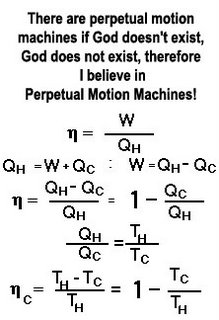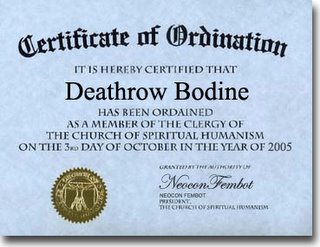 Although I believe Vox Day is profoundly uninformed (very uncharacteristic of Vox) about the inerrancy of Scripture, I regularly enjoy his commentary on WorldNetDaily and find him to usually be quite knowledgeable and entertaining. Perhaps it is because he is something of a kindred spirit. After all, how many Christian libertarians, who are both members of a Southern Baptist church and Mensa, can there be out there?
Although I believe Vox Day is profoundly uninformed (very uncharacteristic of Vox) about the inerrancy of Scripture, I regularly enjoy his commentary on WorldNetDaily and find him to usually be quite knowledgeable and entertaining. Perhaps it is because he is something of a kindred spirit. After all, how many Christian libertarians, who are both members of a Southern Baptist church and Mensa, can there be out there?[On the very unlikely chance that Vox happens by this blog, I have provided further explanation of my disagreement with him below]
Getting on with the topic of this post, I would like to point out one commentary that I found to be particularly insightful. He answers questions that I, too, have been often asked and was sadly inept at answering.
Excerpts from Vox's article The Irony of the Intelligent Believer:
- How can you – an intelligent individual with an expensive education – possibly take seriously what is at best archaic mythology? How can someone who is otherwise considered to be smart subscribe to what amounts to nothing more than fairytales dressed up as history? And how can anyone who is clearly cognizant of Science ever declare allegiance to its great antithesis, Superstition?
The first, and most obvious, answer is that one obviously can because others of historically remarkable intelligence have. There is no shortage of devout Christians on the list of mankind's most legendary geniuses – many of whom are still rightly revered by atheists and agnostics today.
The second answer is a utilitarian one. Science is a whore. Her very essence precludes certainty, which is both a genuine strength and a grave weakness. It is a strength because the scientific method of testing hypotheses encourages a continual seeking after the truth, to which no one who lives by a book that declares "seek and ye shall find" should object. It is a weakness because the inherent mutability of science is at odds with the human desire for objective guidelines by which to live. This conflict tends to repeatedly create faux-sciences, which, however outmoded, are clung to with all the diehard fervor of the religious fanatic.
As for the secular humanists who are second to none in waving the black-and-white flag of Science, the ongoing demographic collapse of their cherished equalitarian societies in every Western nation is proving their theory of religion's deleterious effect on society to be as errant and intellectually bankrupt as Freud's is with regard to the individual. Theirs is a rotten fruit indeed.
[Third] From a utilitarian perspective, then, it makes a tremendous amount of sense for an individual or a society to live by the precepts of the Bible, even if one does so sans belief. This is, I would argue, the most purely rational position, and indeed, famous non-believers such as Voltaire and the 18th-century deists so beloved by modern atheists – as long as they stay safely buried in the 1700s – would agree.
The fourth answer is reciprocal action. Newton's third law states that all forces occur in pairs, and that paired forces are equal in magnitude and opposite in direction. Even when I was an agnostic, I marveled at the hatred and energy expended on Christians by non-Christians. I could not understand the cognitive dissonance demonstrated by the so-called experts in their rabid attempts to discredit all things even nominally related to Christianity – the nominally Jewish Anti-Defamation League's attack on the Ten Commandments being only the most ironic example of late – as well as their ready willingness to distort and even fabricate history.
Vox’s “theory” on Biblical inerrancy is uncomfortably similar to “implied Docetism” discussed by John H. Gerstner in his work titled “Biblical Inerrancy. Recognizing Vox’s lingual objections, a better theory for him to hold is as follows:
The Bible is without error in all that it teaches, on every subject, in the original manuscripts. The original Hebrew and Greek autograph copies of the Bible were inerrant. Certainly the copies of copies which have come down to us contain errors common to the craft of the copyist as do all English versions. However, with diligent study, we can ascertain the original words of the inspired writers. Consequently, the doctrine of inerrancy applies to the biblical text in our day as well -- insofar as the Bible has been accurately translated.
I would expect Vox would eminently enjoy the intellectual treatments of this topic, as do I, by the “Old Princeton” scholars, particularly B.B. Warfield’s The Inspiration and Authority of the Bible. (Generally recognized as on of the best studies ever done on the subject.)
Oh, and Vox … while I’m at it … be more classy and treat a lady (Michelle) with a little more chivalry … a bit of humility wouldn’t hurt you none either! ;-D

 Intelligent Design has been criticized in comments on this blog for claiming that “God did it.” This is a straw-man fallacy about what the Christian proponents of ID also believe rather than what the essence of what ID is. (There are a large number of non-Christian and even non-theistic proponents of ID with whom I share a common cause.) It has been suggested that we ask, “What did it?” I believe what the person asking really meant was “What, other than God, did it?” In other words, their mind is closed to any solution in which God is part of the answer. While I am willing to debate upon the level playing field that God may or may not be part of origins, I will not concede that God was not involved in origins because I see overwhelming evidence and reason for the contrary. Therefore, why don’t we see if we can know what did NOT do it.
Intelligent Design has been criticized in comments on this blog for claiming that “God did it.” This is a straw-man fallacy about what the Christian proponents of ID also believe rather than what the essence of what ID is. (There are a large number of non-Christian and even non-theistic proponents of ID with whom I share a common cause.) It has been suggested that we ask, “What did it?” I believe what the person asking really meant was “What, other than God, did it?” In other words, their mind is closed to any solution in which God is part of the answer. While I am willing to debate upon the level playing field that God may or may not be part of origins, I will not concede that God was not involved in origins because I see overwhelming evidence and reason for the contrary. Therefore, why don’t we see if we can know what did NOT do it. Some Christian bloggers may not look at it this way, but I consider it immensely flattering to have my very own atheist troll hanging around my blog. It confirms that what I am writing is relevant and impactful enough to elicit another person to spend their precious time attempting to refute what I have to write about. Furthermore, the troll’s input has provided with me with enough ideas for future blog posts to last at least a year or more. Even better, my troll seem to be blog-house broken and doesn’t go around messing up the blog-carpet with senseless profanity. It [my troll] generally just sticks to caustic insults but occasionally asks a tough question that deserves an answer. Not just a flippant unconsidered response, but a truly researched and intellectual answer. I intend to attempt do so.
Some Christian bloggers may not look at it this way, but I consider it immensely flattering to have my very own atheist troll hanging around my blog. It confirms that what I am writing is relevant and impactful enough to elicit another person to spend their precious time attempting to refute what I have to write about. Furthermore, the troll’s input has provided with me with enough ideas for future blog posts to last at least a year or more. Even better, my troll seem to be blog-house broken and doesn’t go around messing up the blog-carpet with senseless profanity. It [my troll] generally just sticks to caustic insults but occasionally asks a tough question that deserves an answer. Not just a flippant unconsidered response, but a truly researched and intellectual answer. I intend to attempt do so.



 There are two incorrect ways to look at Christian doctrine. One is to take an anti-intellectual approach; the other is to take an overly rigid rational approach
There are two incorrect ways to look at Christian doctrine. One is to take an anti-intellectual approach; the other is to take an overly rigid rational approach In the epistemological discussion posted yesterday, there are some truths that arise that I wanted to post today as a side note:
In the epistemological discussion posted yesterday, there are some truths that arise that I wanted to post today as a side note:
 To be "An Angry Christian" begs readers to ask these questions: Isn’t anger a sin? Is it possible to be angry without sinning? Are the terms "angry" and "Christian" contradictory?
To be "An Angry Christian" begs readers to ask these questions: Isn’t anger a sin? Is it possible to be angry without sinning? Are the terms "angry" and "Christian" contradictory?  Those more educated now tend to be significantly less religious; those more religious tend to be significantly less educated. For example, evangelicals are the only religious group in America that exceeds the national average of those not completing the eighth grade or high school. At the same time only 24.2 percent of evangelicals achieve some university training, compared with 68 percent of non-Christians.
Those more educated now tend to be significantly less religious; those more religious tend to be significantly less educated. For example, evangelicals are the only religious group in America that exceeds the national average of those not completing the eighth grade or high school. At the same time only 24.2 percent of evangelicals achieve some university training, compared with 68 percent of non-Christians.